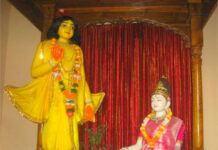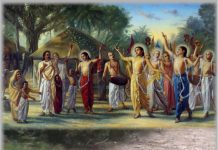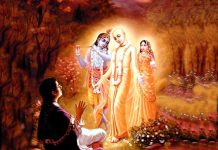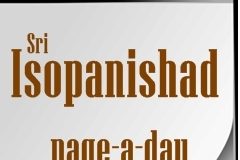
Continued from previous page… He must offer everything for the Lord’s service and partake only of the remnants of food offered to the Lord. This will enable him to discharge his duty properly. In the Bhagavad-gita (9.26) the Lord directly states that He accepts vegetarian food from the hands of a pure devotee. Therefore a human being should not only become a strict vegetarian but should also become a devotee of the Lord, offer the Lord all his food and then partake of such prasadam, or the mercy of God. Only those who act in this way can properly discharge the duties of human life. Those who do not offer their food to the Lord eat nothing but sin and subject themselves to various types of distress, which are the results of sin (Bg. 3.13).
The root of sin is deliberate disobedience of the laws of nature through disregarding the proprietorship of the Lord. Disobeying the laws of nature or the order of the Lord brings ruin to a human being. Conversely, one who is sober, who knows the laws of nature, and who is not influenced by unnecessary attachment or aversion is sure to be recognized by the Lord and thus become eligible to go back to Godhead, back to the eternal home.
MANTRA 2
TRANSLATION. One may aspire to live for hundreds of years if he continuously goes on working in that way, for that sort of work will not bind him to the law of karma. There is no alternative to this way for man.
PURPORT. No one wants to die: everyone wants to live as long as he can drag on. This tendency is visible not only individually but also collectively in the community, society and nation. There is a hard struggle for life by all kinds of living entities, and the Vedas say that this is quite natural. The living being is eternal by nature, but due to his bondage in material existence he has to change his body over and over. This process is called transmigration of the soul or karma-bandhana, bondage by one’s work. The living entity has to work for his livelihood because that is the law of material nature, and if he does not act according to his prescribed duties, he transgresses the law of nature and binds himself more and more to the cycle of birth and death in the many species of life.
Other life forms are also subject to the cycle of birth and death, but when the living entity attains a human life, he gets a chance to get free from the chains of karma. Karma, akarma and vikarma are very clearly described in the Bhagavad-gita. Actions that are performed in terms of one’s prescribed duties, as mentioned in the revealed scriptures, are called karma. Actions that free one from the cycle of birth and death are called akarma. And actions that are performed through the misuse of one’s freedom and that direct one to the lower life forms are called vikarma.
Of these three types of action, that which frees one from the bondage to karma is preferred by intelligent men. Ordinary men wish to perform good work in order to be recognized and achieve some higher status of life in this world or in heaven, but more advanced men want to be free altogether from the actions and reactions of work. Intelligent men well know that both good and bad work equally bind one to the material miseries. Consequently they seek that work which will free them from the reactions of both good and bad work. Such liberating work is described here in the pages of Sri Isopanishad.
The instructions of Sri Isopanishad are more elaborately explained in the Bhagavad-gita, sometimes called the Gitopanishad, the cream of all the Upanishads. In the Bhagavad-gita (3.9-16) the Personality of Godhead says that one cannot attain the state of naishkarmya, or akarma, without executing the prescribed duties mentioned in the Vedic literature. This literature can regulate the working energy of a human being in such a way that he can gradually realize the authority of the Supreme Being.
(To continue read the next page…)
Source: Sri Isopanishad. Translation and purports by His Divine Grace A.C.Bhaktivedanta Swami Prabhupada. Copyright BBT International http://www.vedabase.com/en/iso

























